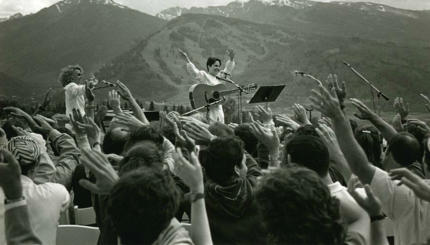Ofra Haza was born on November 19, 1957 in the Hatikvah quarter of Tel Aviv to parents who had immigrated from Yemen with their eight sons and daughters. Her mother, already a singer in Yemen, would often perform at family celebrations. Haza herself sang from an early age and was a soloist in her local school choir.
As part of the neighborhood program of the Tel Aviv Municipality, the Hatikvah Quarter Theater Workshop was established under the leadership of Bezalel Aloni. Haza was accepted into the workshop at the age of twelve and it was through this program that in 1973 she sang the song “Ga’agu’im” (Yearning), which became famous, reaching first place on the hit parade. At the Music Festival of 1974, the song “Shabbat ha-Malkah,” performed by Haza, took third place. Following her army service, Haza decided to make singing a career.
Since Israel’s major songwriters initially rejected Haza’s requests to write songs for her, her manager Bezalel Aloni began composing works for her himself. In 1979, Haza appeared in the film Shlagger (Hit) performing the song “Shir ha-Freha,” written by Assi Dayan and Svika Pick. The song became a huge hit and Haza led the hit parades on all the radio stations, earning the title “Singer of the Year” four times from 1980 to 1983.
Breaking into the International Music Scene
In Israel’s “Pre-Eurovision” song competition in 1983 Haza performed the winning song, entitled “Hai,” by Ehud Manor and Avi Toledano. She traveled to Germany to represent Israel in the Eurovision Song Contest, where the song took second place. Her major international breakthrough came in the wake of the album Shirei Teiman (Yemenite songs), which she recorded in 1984.

Help us keep Jewish knowledge accessible to millions of people around the world.
Your donation to My Jewish Learning fuels endless journeys of Jewish discovery. With your help, My Jewish Learning can continue to provide nonstop opportunities for learning, connection and growth.
Shirei Teiman consisted of songs that Haza had heard in childhood, using arrangements that combined authentic Middle Eastern percussion with classical instruments. The composer-arranger Izhar Ashdot, who remixed the album’s songs, added electronic instruments to the song “Galbi” (Libi [My heart] in Hebrew). Set to a Middle Eastern beat, the song became a “dance music” hit. A DJ from the Voice of Peace radio station passed along Ashdot’s version to friends in Europe, and the song was released by German record giant BMG, which distributed it throughout Europe, particularly in France and Germany. “Galbi” became a huge international hit.
Haza’s star continued to rise, both in Israel and abroad. In 1988 Izhar Ashdot and Yair Nitzani did a remix of the song “Im Nin’alu,” first recorded by Haza for her Shirei Teiman album in 1984. After hip-hop artists and sampling pioneers Eric B & Rakim inserted the original version plus an addition by Haza in English and German into their song “Seven Minutes of Madness,” Haza’s “Im Nin’alu” soared to international fame. By the end of 1987 the song had sold more than two million copies worldwide.
Sales of another Haza album, Shaday (1988), passed the one-million mark in Europe, adding to Haza’s international recognition. That same year, Haza placed first in the Golden Lion television competition in Germany and the International Song Festival in Tokyo. In 1989 she moved to New York and also made a successful appearance at the London Palladium. Such renowned music producers as Arif Mardin and Thomas Dolby asked to work with her and ultimately produced her Desert Wind album (1989).
Collaboration
Singers Paul Anka and Cliff Richard recorded duets with her. Haza also recorded a duet in 1997 with the singer Iggy Pop for his album, which was nominated for a Grammy award that year. In 1989 Haza was invited by Steven Spielberg to perform the song “Deliver Us” for the animated feature The Prince of Egypt. She recorded the song in twenty-nine languages and even voiced the role of Yokheved, mother of Moses, in the film. In 1990, Haza turned down an offer by singer Michael Jackson for a joint international concert tour.
In the course of her meteoric rise, the top Israeli songwriters, including Naomi Shemer, Ehud Manor, Sasha Argov, Wilensky, Svika Pick, and many others, offered her their songs. A large part of her repertoire was written by Bezalel Aloni, her manager of many years. Other songs were written by Haza herself, in collaboration with Aloni or with composers and lyricists who wrote for her. A considerable proportion of Haza’s repertoire was based on traditional Yemenite songs.
Despite her extensive international career, Haza never ceased performing in Israel, where her appearances always drew large audiences. She frequently appeared at army bases in the North and South of the country. While returning from one of these shows, the plane carrying her and Aloni crashed; miraculously, the two survived. Haza performed at numerous Israeli song festivals for children and adults, generally singing the winning song. Ofra Haza fan clubs were set up in various locales around Israel.
In 1997 Haza married businessman Doron and shortly thereafter severed her ties with Bezalel Aloni. In 1998 she was chosen to perform Naomi Shemer’s “Jerusalem of Gold” at the official ceremony marking Israel’s fiftieth anniversary.
In February 2000 Haza was rushed to Tel Hashomer Hospital suffering from massive organ failure. She died on February 23, 2000.
Ofra Haza is one of the major links in the chain of Yemenite women singers who have played such a prominent role on the Israeli music scene over the years. Their ranks have included Brachah Zefira, Esther Gamlielit, Shoshana Damari, Ahuva Tzadok and Achinoam Nini.
Reprinted from the Shalvi/Hyman Encyclopedia of Jewish Women with permission of the author and the Jewish Women’s Archive.


